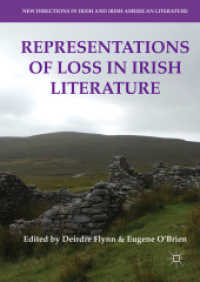- ホーム
- > 洋書
- > 英文書
- > Nature / Ecology
Description
To commemorate the 20th anniversary of the 2004 Indian Ocean Tsunami, Amrita Vishwa Vidyapeetham, in collaboration with the UNESCO Chair on Experiential Learning for Sustainable Innovation and Development, the Amrita School for Sustainable Futures (ASF), and the Centre for Wireless Networks and Applications, convened the International Conference on Tsunami Risk Reduction and Resilience. At the conference, researchers, practitioners, and policymakers jointly explored key learnings, reflections, and innovations since the 2004 Indian Ocean Tsunami. Key themes include tools for enhancing tsunami preparedness and mitigation; models and systems for tsunami detection, monitoring, forecasting, and early warning; sharing best practices and evaluating existing systems and tools; fostering community resilience; enhancing collaborative platforms for cross-border data sharing and response coordination; and leveraging innovations like AI for improved prediction and risk assessment. By advancing Sustainable Development Goals 11 (Sustainable Cities and Communities) and 13 (Climate Action), the contributions presented at the conference support resilient infrastructure and preparedness to mitigate the impacts of natural disasters, contributing to a safer and more resilient future for coastal communities worldwide.
Chapter 1: Coastal Communities' Tsunami Preparedness: Examining The Utility of Social Network Analysis And Social Capital.- Chapter 2: Youth-Led Tsunami Preparedness:Bridging Early Warning System And Indigenous Knowledge In The South Coast of India.- Chapter 3: Empowering Women And Children In Coastal Communities: Enhancing Tsunami Preparedness And Resilience Through Gender-Responsive Disaster Management.- Chapter 4: Mapping Climate Change Awareness Among Students In Kerala: Educational Strategies For Resilience.- Chapter 5: Advancing Tsunami Risk Management: Global Lessons And Strategic Frameworks For Resilience.- Chapter 6: Comparative Analysis of Tsunami Recovery Strategies: Evidence From Asian Region.- Chapter 7: Examining Tsunami Preparedness In Nine Schools of Alappad Community: The Process, Challenges And Way Forward.- Chapter 8: Disaster Risk Reduction And Preparedness: A Probabilistic Tsunami Risk Management Assessment For Eastern Cape Coastal South Africa.- Chapter 9: Integrating Bio-Inspired Technologies Into Tsunami Early Warning Systems: A Sustainable Approach.- Chapter 10: Modelling And Simulation of Tsunami Waves Using Neural Networks.- Chapter 11: A Continuous Wave X Band Radar For Early Tsunami Detection.- Chapter 12: Harnessing Fiber Bragg Grating Sensors For Enhanced Tsunami Monitoring And Early Warning.- Chapter 13: Hybrid Machine Learning Models For Enhanced Tsunami Prediction: Advancing Ai-Driven Disaster Management.- Chapter 14: Development of Habitat Vulnerability Index (Hvi) For Southern Indian Coastal Stretch: A Machine Learning-Based Spatial Modelling Approach.- Chapter 15: Impact of Tsunami On The Chennai Coast: Sea Level Rise, Shoreline Shift, And Effects On Turtles.- Chapter 16: Role of Nature-Based Solutions (Nbs) And Local & Indigenous Knowledge Systems For Protection of Coastal Areas From Hazards: A Case of Tsunami Affected Fishing Villages of Kerala.- Chapter 17: Forgotten Groves: Why Kerala s Mangroves Lack Sacred Status And Why They Need One.- Chapter
18: Improving Water Quality In Disaster-Prone Coastal Communities: Sustainable Solutions For Solai Nagar Community.- Chapter 19: Localized Resilience Hubs For Disaster Risk Reduction And Preparedness.- Chapter 20: Sustainability Reporting of Agricultural Risk Management Strategies For Resilience In Disaster-Prone Coastal Communities of Kerala, India.- Chapter 21: Carbon Footprint Analysis For Sustainable Tourism: The Munroe Island Case Study.- Chapter 22: Two Decades of Lessons: Systematic Review of Mangroves Role In Tsunami Disaster Mitigation (2004 2024).- Chapter 23: Community Resilience And Social Support: A Qualitative Study of Coping Strategies Among Tsunami Survivors In Kerala, India.- Chapter 24: Safeguarding Livelihoods And Pet Companionship: The Role of Livestock And Pet Sheltering In Coastal Disaster Resilience In Kuttanad, Kerala, India.- Chapter 25: Impact of Self-Help Groups On Psychosocial Well-Being And Disaster Preparedness.








